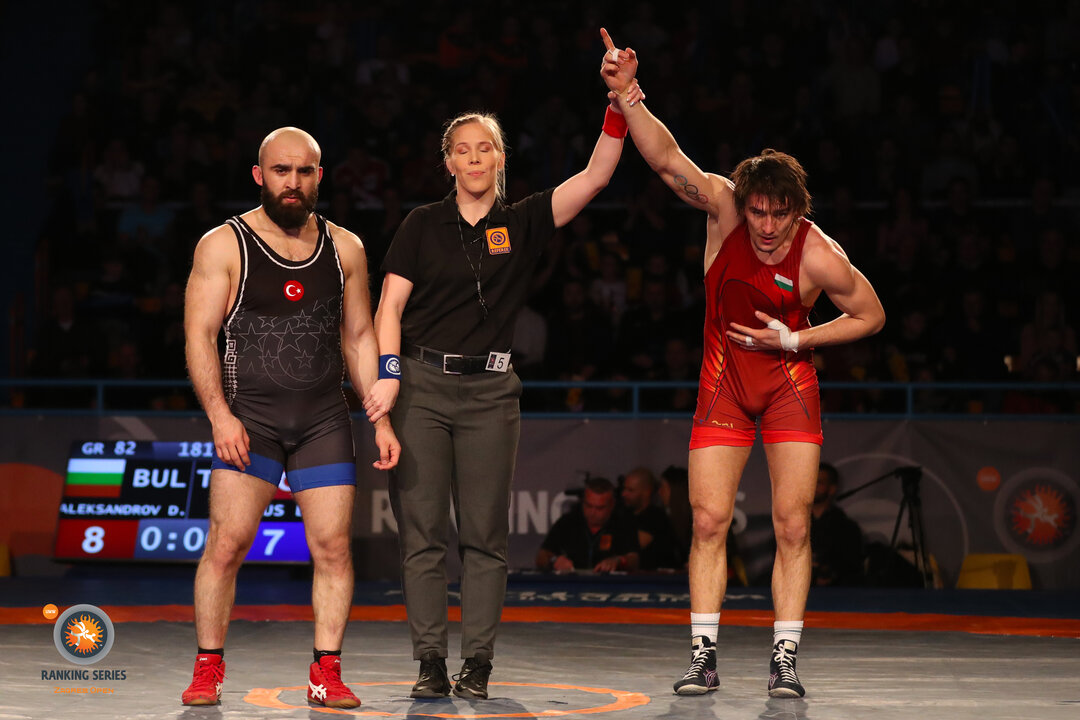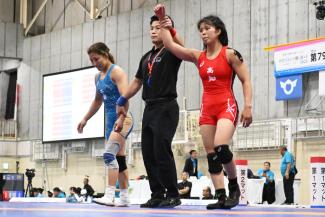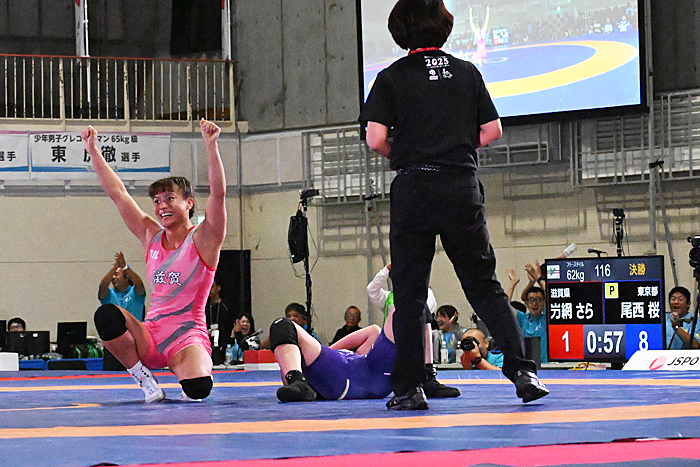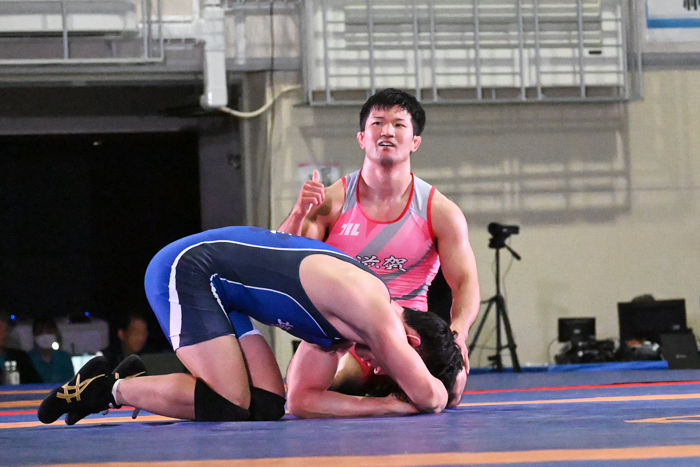Starcevic Soars to Fifth Consecutive Zagreb Open Title
Sunday, February 10, 2019 - 19:09 By Eric Olanowski

ZAGREB, Croatia (February 10) – Bozo STARCEVIC remained patient in his hometown of Zagreb and waited until the last bout of the tournament, but the Croatian wrestler capped off his impressive run to a fifth consecutive Zagreb Open title with a tactical 2-1 victory over Turkey’s Yunus BASAR in the 77kg finals.
Starcevic, the hometown wrestler, grabbed the 1-0 lead after receiving a passivity point but found himself fighting back in the second period after Basar gained the 1-1 lead on criteria with a passivity point of his own.
With just over a minute left, the Croatian wrestler continued to push the pace and broke the 1-1 tie after he was awarded a second passivity point. Starcevic remained composed in the final 30 seconds and closed out the match with the 2-1 victory, locking up his fifth consecutive Zagreb Open title.
Starcevic's run to his fifth title also included a 6-1 quarterfinals win over Olympic champion KIM Hyeonwoo (KOR).

Bulgaria’s Daniel ALEKSANDROV erased a 7-0 deficit to defeat reigning world silver medalist Emrah KUS (TUR) in the 82kg gold-medal bout. (Photo Kadir Caliskan)
Two World Silver Medalists Go Down
Bulgaria’s Daniel ALEKSANDROV and Russia’s Ilia BORISOV knocked off reigning world runner-up’s Emrah KUS (TUR) and Kiril MILOV (BUL) respectively to with their first Zagreb Open titles.
Aleksandrov trailed 7-0 after the first two minutes of action. He was dinged for passivity and thrown in par terre position, where Kus grabbed four-points from a reverse lift to control the 5-0 advantage. Aleksandrov found himself down 7-0 after Kus grabbed another two for exposure, but got on the board with a step out point and trailed 7-1 heading into the second period.
The Bulgarian exploded for seven points in the closing three minutes and hung on to the 8-7 lead to knock off the clearly deflated returning world runner-up, 8-7.
Borisov grabbed the 1-0 lead after Milov was hit for passivity. The Russian went to work in par terre, throwing Milov for four points, then used a pair of gut wrenches to close out the 97kg gold-medal match with a 9-0 technical superiority victory.
Uzbekistan and Hungary Win Pair of Golds
Islomjon BAKHRAMOV and Elmurat TASMURADOV handed Uzbekistan a pair of gold medals, while Robert Attila FRITSCH (HUN) and Viktor LORINCZ (HUN) won Hungary's two Zagreb Open titles.
In the 63kg finals, Islomjon Bakhramov struck first with a four-point throw, but Xavier JOHNSON (USA) quickly scored a two-point exposure and cut the Uzbek's leads to 4-2. Bakhramov stayed offensive and scored a pair of takedowns and a gut wrench, ending the 63kg gold-medal match early with a 10-2 technical superiority victory.
Elmurat Tasmuradov gave Uzbekistan their second gold medal of the day. Tasmuradov came out on fire in the opening seconds of 67kg finals and threw a huge headlock to secure the 4-0 lead over U23 and senior-level European champion Mihai MIHUT (ROU). Tasmuradov surrendered a step out point to the Romanian wrestler, but his first-period four-point throw was enough to give him the 4-1 victory.
Robert Fritsch won Hungary's first gold medal of the night after Georgia's Ramaz ZOIDZE injury defaulted out of the 72kg finals.
At 87kg, Viktor Lorincz grabbed a passivity point and a low-level gut and took the 3-0 lead over Kristoffer Zakarias BERG (SWE) into the second period. Lorincz gave up a passivity point but didn’t get turned and held on to the 3-1 decision over Berg, giving Hungary their second gold medal of the night.
Kamal and Marvik Win Remaining Two Gold Medals
There wasn't a 55kg gold-medal bout because it was a round-robin competition, so the final two gold medals went to Turkey's Kerem KAMAL and Norway's Oskar MARVIK (NOR).
In the 60kg gold-medal bout, two-time junior world champion Kerem Kamal handled Iran’s Milad REZANEZHAD from whistle-to-whistle and scored his first senior-level gold medal with the 9-3 victory, while Oskar Marvik used a first-period passivity point to defeat Muminjon ABDULLAEV (UZB), 1-0, in the 130kg finals.
Team Scores
GOLD - Turkey (132 points)
SILVER - Uzbekistan (101 points)
BRONZE - Croatia (91 points)
Fourth - Bulgaria (85 points)
Fifth - Hungary (83 points)
55kg (Round-Robin)
GOLD - Poya Soulat DAD MARZ (IRI)
SILVER - Ekrem OZTURK (TUR)
BRONZE - Alexandru Vasile BOTEZ (ROU)
60kg
GOLD - Kerem KAMAL (TUR) df. Milad Ali REZANEZHAD (IRI), 9-3
BRONZE - Erik TORBA (HUN) df. Virgil MUNTEANU (ROU), 3-3
BRONZE - Ivan LIZATOVIC (CRO) df. Seunghak KIM (KOR), 4-3
63kg
GOLD - Islomjon BAKHRAMOV (UZB) df. Xavier JOHNSON (USA), 10-2
BRONZE - Dawid Andrzej ERSETIC (POL) df. Irakli DZIMISTARISHVILI (GEO), 12-0
BRONZE - Firuz TUKHTAEV (UZB) df. Travis Michael RICE (USA), 9-0
67kg
GOLD - Elmurat TASMURADOV (UZB) df. Mihai Radu MIHUT (ROU), 4-1
BRONZE - Enes BASAR (TUR) df. Morten THORESEN (NOR), 9-0
BRONZE - Ignazio SANFILIPPO (ITA) df. Danijel JANECIC (CRO), via injury default
72kg
GOLD - Robert Attila FRITSCH (HUN) df. Ramaz ZOIDZE (GEO), via injury default
BRONZE - Aik MNATSAKANIAN (BUL) df. Cengiz ARSLAN (TUR), 3-1
BRONZE - Mateusz Lucjan BERNATEK (POL) df. Mate NEMES (SRB), 3-1
77kg
GOLD - Bozo STARCEVIC (CRO) df. Yunus BASAR (TUR), 2-1
BRONZE - Mohammad Aziz NAGHOUSI (IRI) df. Ilie COJOCARI (ROU), 7-4
BRONZE - Hyeonwoo KIM (KOR) df. Rafael IUNUSOV (RUS), 10-0
82kg
GOLD - Daniel ALEKSANDROV (BUL) df. Emrah KUS (TUR), 8-7
BRONZE - Burhan AKBUDAK (TUR) df. Jalgasbay BERDIMURATOV (UZB), 2-1
BRONZE - Karlo KODRIC (CRO) df. Aivengo RIKADZE (GEO), via injury default
87kg
GOLD - Viktor LORINCZ (HUN) df. Kristoffer Zakarias BERG (SWE), 3-1
BRONZE - Tadeusz MICHALIK (POL) df. Yoan Danielov DIMITROV (BUL), 6-3
BRONZE - Arkadiusz Marcin KULYNYCZ (POL) df. Erik SZILVASSY (HUN), 4-3
97kg
GOLD - Ilia BORISOV (RUS) df. Kiril Milenov MILOV (BUL), 9-0
BRONZE - Jahongir TURDIEV (UZB) df. Zsolt TOEROEK (HUN), 11-0
BRONZE - Tracy Gangelo HANCOCK (USA) df. Adam VARGA (HUN), 4-0
130kg
GOLD - Oskar MARVIK (NOR) df. Muminjon ABDULLAEV (UZB) , 1-0
BRONZE - Yasmani ACOSTA FERNANDEZ (CHI) df. Osman YILDIRIM (TUR), 5-1
BRONZE - Miloslav Yuriev METODIEV (BUL) df. Marko KOSCEVIC (CRO), 5-1


 Sara NATAMI (JPN) celebrates after beating Sakura ONISHI (JPN). (Photo: wrestling-spirits.jp)
Sara NATAMI (JPN) celebrates after beating Sakura ONISHI (JPN). (Photo: wrestling-spirits.jp) Taishi NARIKUNI (JPN) won the 74kg gold medal. (Photo: wrestling-spirits.jp)
Taishi NARIKUNI (JPN) won the 74kg gold medal. (Photo: wrestling-spirits.jp)
Share your thoughts.
Comments